Key takeaways:
- Initial motivation for political engagement stemmed from recognizing the potential impact of personal and collective voices in shaping community issues.
- Understanding different political systems enhances effective engagement, empowering citizens to influence policy through informed dialogue.
- Identifying key issues in politics is driven by personal experiences and communal discussions on topics like affordable housing, environmental sustainability, and social justice.
- Leveraging social media as a tool for influence can mobilize action and inspire others through storytelling and personal narratives.
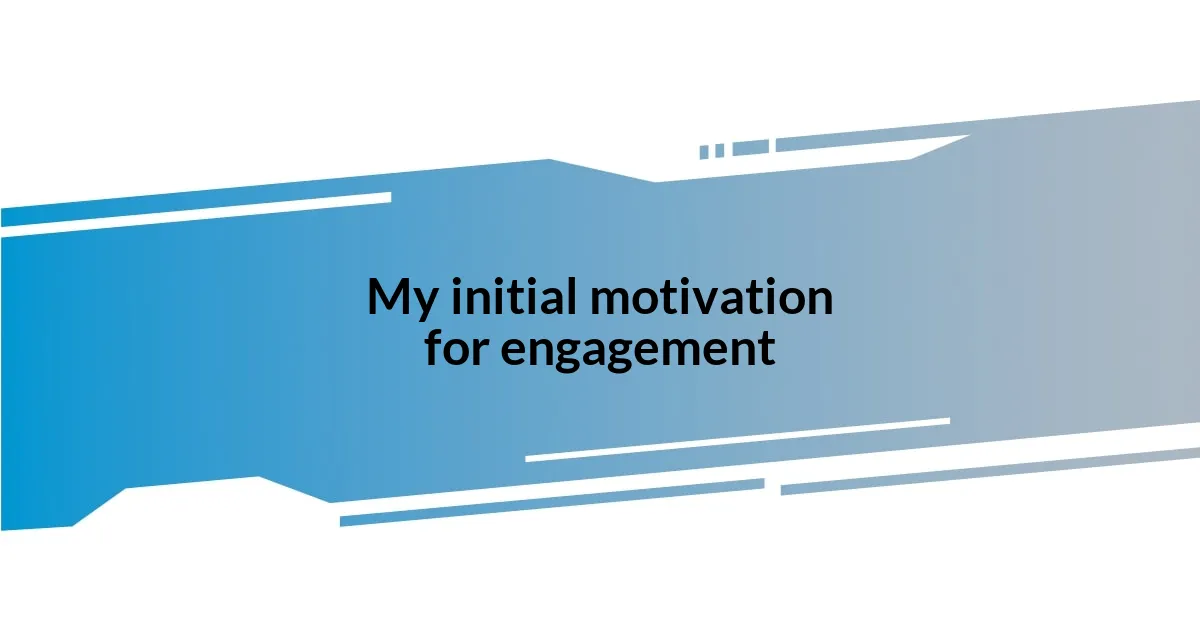
My initial motivation for engagement
I remember attending a community meeting back in college, feeling a mix of curiosity and apprehension. The room buzzed with energy; passionate voices spoke about local issues that struck a chord with me. It made me wonder, what if my voice mattered in shaping the future of my community? This realization ignited my desire to dive into political engagement.
Around that time, I saw a news story about a local project that had been halted due to bureaucratic red tape. It frustrated me deeply. Why are decisions made without considering the voices of the people they affect? That question lingered in my mind, pushing me to seek out ways to get involved and make a difference. I began to understand that being engaged wasn’t just about voting; it was about advocating for the changes I wanted to see.
As I explored various ways to participate, I found that my motivation was not just personal but also collective. I’d often chat with friends about our frustrations and dreams for our neighborhoods. These conversations fueled my belief that together we could push for the change we sought. I realized that my initial motivation wasn’t just about my own interests; it was about being part of something bigger than myself.
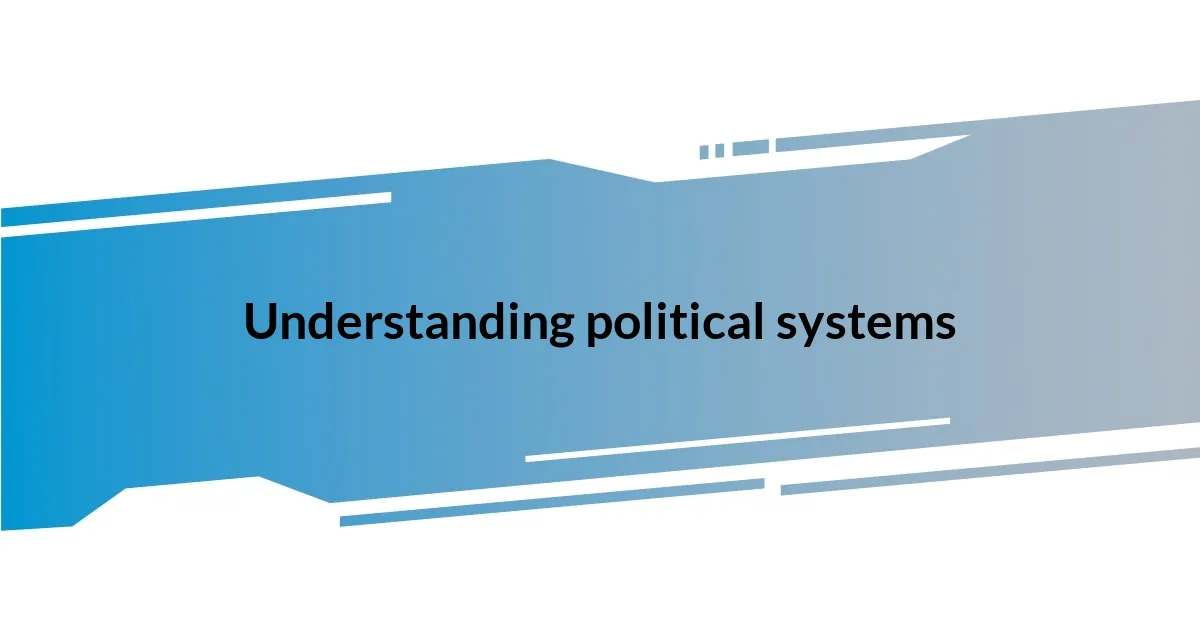
Understanding political systems
Understanding political systems is essential for anyone eager to engage effectively. From my own journey, I’ve seen the significant role that different political structures play in shaping how decisions are made. For instance, when I learned about the differences between a parliamentary and a presidential system, it truly impacted my understanding of how power dynamics function. In a parliamentary system, the government can be more responsive to the public, whereas a presidential system often requires more checks and balances, which can slow down decision-making.
I remember attending a town hall meeting where local government representatives discussed zoning laws. The way they articulated their decisions highlighted the importance of understanding our local political structure. Those present were empowered; they asked pointed questions and shared their concerns. It was a vivid illustration of how an informed citizenry can directly influence policy. When you grasp the mechanics behind these systems, you feel more equipped to take action, whether that means voting or mobilizing others.
Reflecting on national elections, I’ve noticed that many people don’t realize that political engagement can extend beyond the ballot. For instance, understanding how political parties operate can aid in navigating conversations about key issues like healthcare reform or education policy. Engaging with these systems requires not just awareness but a commitment to staying informed and actively participating in dialogue. It’s all connected; as I began to understand these structures, I felt more motivated to engage, knowing the impact it could have not just on myself but on my community.
| Political System | Description |
|---|---|
| Parliamentary System | Government is elected by and responsible to the parliament, often leading to quicker decisions. |
| Presidential System | Separate executive and legislative branches, providing checks and balances but potentially slowing decision-making. |
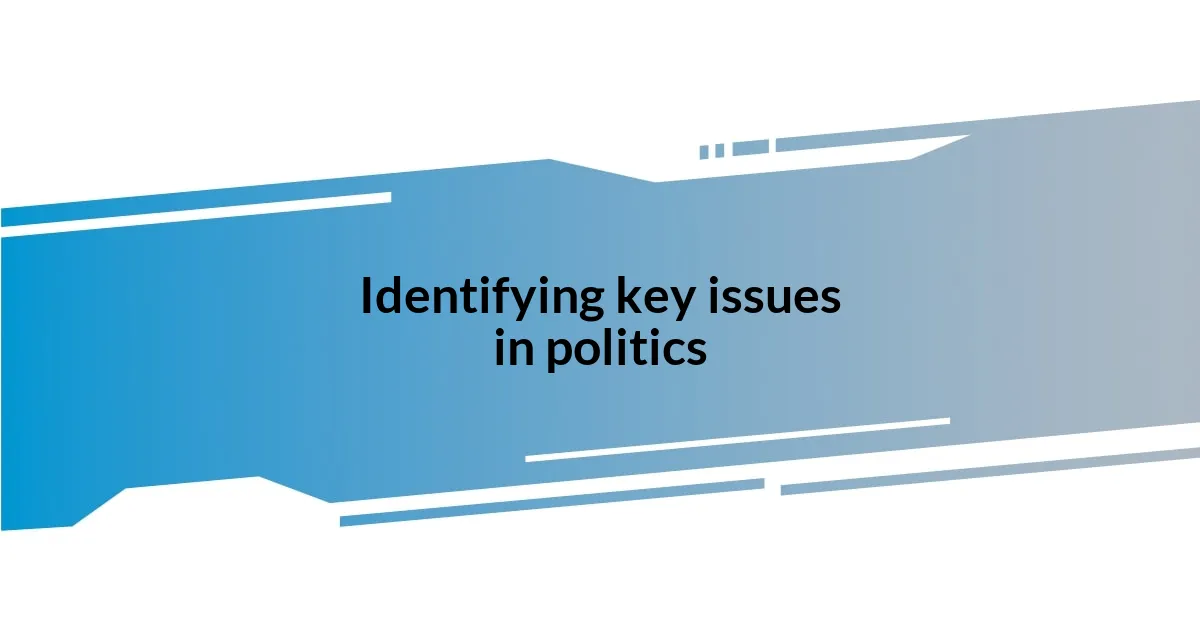
Identifying key issues in politics
Identifying the key issues in politics often starts with what resonates most in our lives, which I’ve found to be deeply personal. I recall sitting with friends over coffee, each of us sharing what we thought mattered most: affordable housing, environmental sustainability, and social justice were frequent topics. These discussions revealed not just our frustrations but also our hopes for a better future. It’s this blend of personal experiences and communal dialogue that helps shed light on the issues we should prioritize in political discourse.
- Affordable Housing: Many of my peers struggled to find living spaces within their budgets, prompting conversations about local policies that enable or hinder housing opportunities.
- Environmental Sustainability: I distinctly remember participating in a rally where voices passionately called for measures against climate change. It was powerful to see how many cared about leaving the planet better for future generations.
- Social Justice: The protests for equality sparked memories of classroom debates. It became clear to me that issues around justice and equity were not simply theoretical; they impacted lives in real, tangible ways.
By engaging in discussions and reflecting on shared concerns, we can typically pinpoint the pressing issues demanding our attention. It’s through these informal dialogues that I gained clarity on what matters most, motivating me to take more active steps in political engagement.
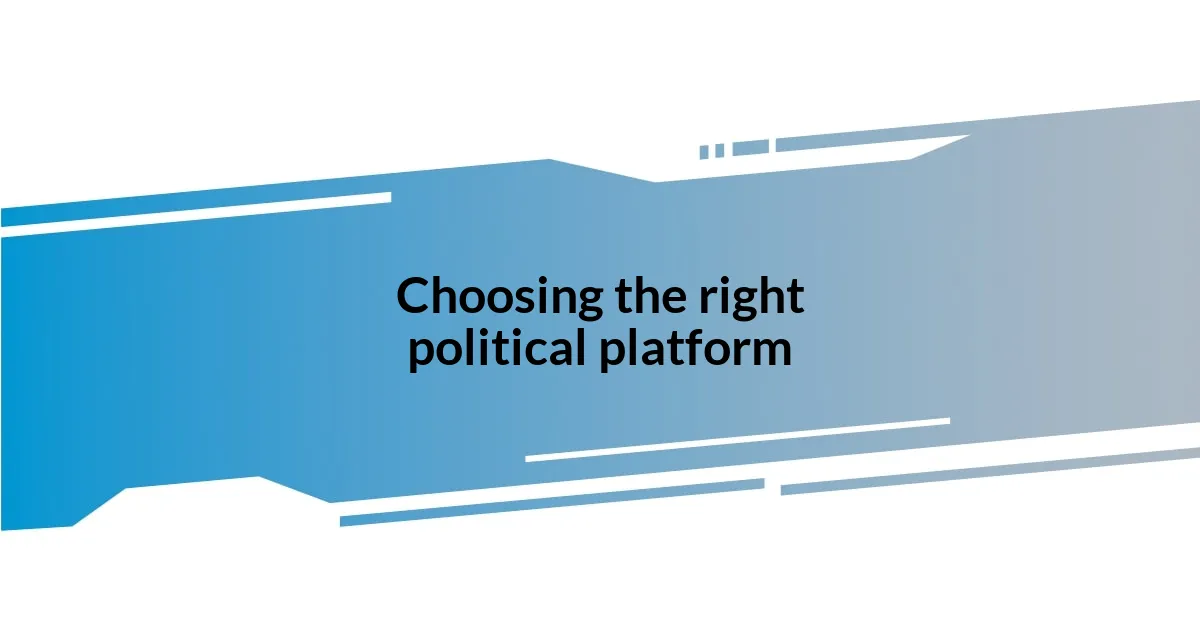
Choosing the right political platform
Choosing the right political platform involves aligning your values with the principles and actions of a party. I remember the moment I realized this during a community gathering. I listened to representatives from different parties speak passionately about their visions, and it dawned on me how essential it was to find a platform that reflected not just my opinions, but also the changes I wanted to see in my community. Have you ever felt that disconnect between your beliefs and those of the candidates vying for your vote? It’s a disheartening place to be.
Through my experiences, I’ve come to understand that research is paramount. Attending local events allowed me to see beyond slick campaign materials; instead, I engaged directly with activists and party leaders and asked them tough questions about their policies. For example, when I inquired about their stance on education reform, the answers varied drastically. Some were vague, while others offered concrete examples and strategies. Observing this distinction helped me recognize that a party’s commitment to issues truly matters.
Finding the right platform also means looking at the overall impact of your political engagement. When I chose to support candidates who prioritized community health initiatives, I did so with the hope of fostering a supportive environment for families. It’s rewarding to know that, through informed choices, I’m contributing to a broader movement for positive change. How do you want your voice to matter in political discourse? Ultimately, it’s about feeling empowered and assured that your engagement can shape the future you envision.
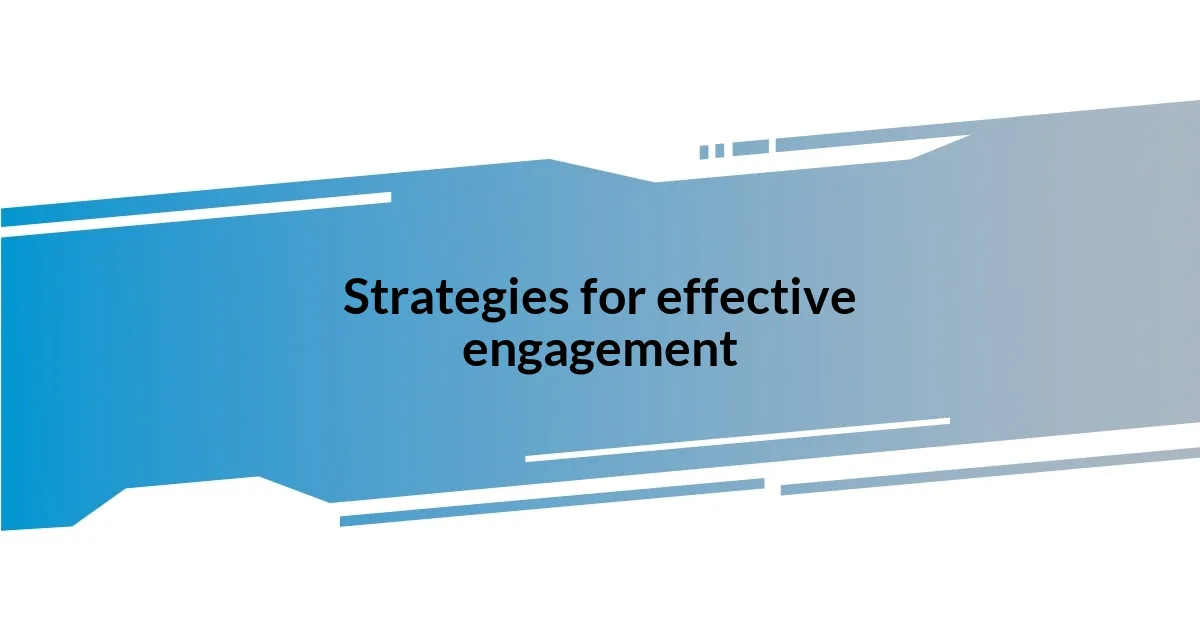
Strategies for effective engagement
Building effective engagement in politics requires more than just passion; it’s about being strategic. I remember a local town hall meeting where I felt apprehensive but decided to voice my concerns about public transportation. As I shared my thoughts, I could see others nodding in agreement, and that moment taught me the power of connection. Have you ever felt that surge of collective energy when you realize others share your views? It’s in those spaces that genuine change begins.
Another approach I’ve found helpful is to utilize social media mindfully. During a digital campaign for environmental advocacy, I created a series of informative posts that highlighted local initiatives. Each time someone commented or shared my content, it sparked further dialogue. This reminded me that engagement doesn’t always require a physical presence; sometimes, your voice can echo far and wide in the digital realm. Have you considered how your online activity might mobilize others in your community?
Lastly, I learned the importance of coalition-building. I recall an inspiring experience when different community organizations joined forces to address mental health issues in our area. The diversity of perspectives energized our approach, and we crafted a comprehensive plan that reflected our shared concerns. Have you thought about collaborating with others who share your vision? Those alliances not only amplify our voices but can also lead to innovative solutions that might not emerge when we work in isolation.
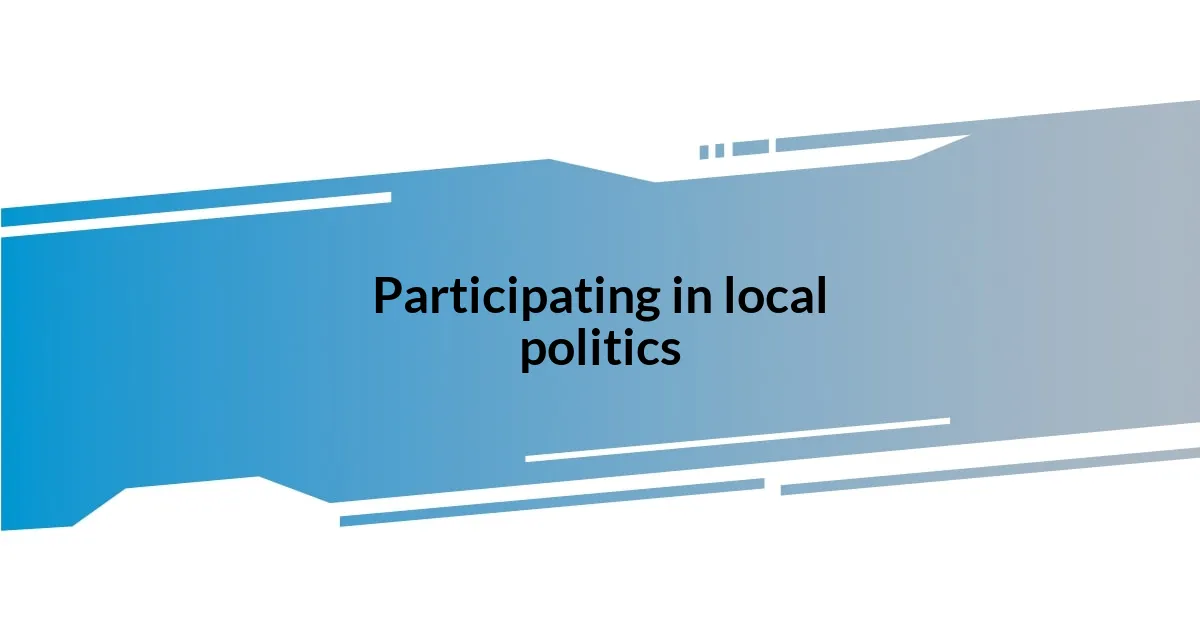
Participating in local politics
Engaging in local politics can be an enlightening experience. I once volunteered for a neighborhood council meeting, and the diverse voices there opened my eyes to issues I had never even considered. Have you ever sat in a room and felt your perspective shift simply by hearing someone else’s story? It’s incredible how powerful those conversations can be, sparking not just understanding, but a genuine desire to advocate for change.
One of my most rewarding moments came when I participated in organizing a community clean-up event that tied into local environmental legislation. As we picked up litter, the discussion flowed from the importance of keeping our neighborhoods clean to the larger implications of our city’s waste management policies. It was like peeling back layers of awareness, where each piece of trash symbolized neglect within the system. It made me realize that local participation is often about tackling the small issues that echo the larger conversations we need to have.
I’ve found that attending city council meetings can be a game changer. Initially, I was intimidated, unsure how to voice my thoughts among seasoned politicians and advocates. However, I decided to attend regularly and eventually mustered the courage to share my insights on affordable housing. That single experience not only gave me confidence but also connected me with others who care deeply about the same issues. Have you ever realized that your voice can ignite discussions? Each time you speak up, you contribute to a tapestry of community engagement that can lead to tangible change.
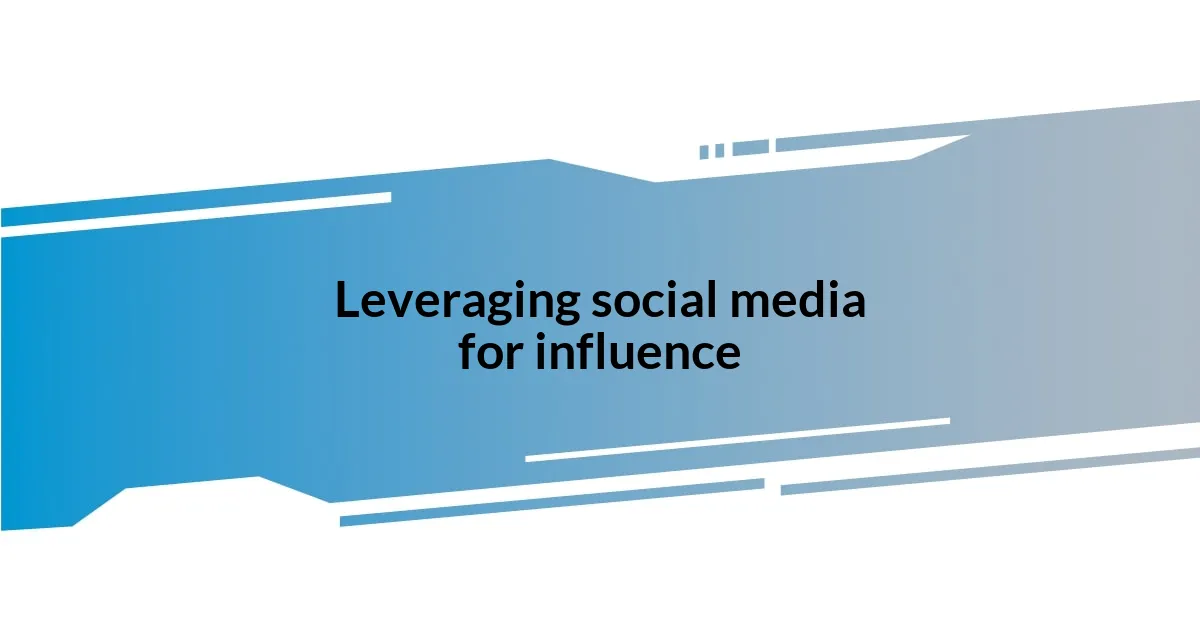
Leveraging social media for influence
Social media has become a powerful tool for political influence in my experience. I remember launching an Instagram campaign advocating for voter registration in my community. With each post, I felt a growing sense of responsibility as likes and shares multiplied. Hasn’t it struck you how a single caption can spark conversations and mobilize action? I realized that my words, even in a digital space, could push my neighbors to register and vote.
One particular tweet that I crafted resonated deeply with my followers. It was a simple but heartfelt message about the importance of listening to young voices in politics. To my surprise, it garnered attention from local leaders who started responding and even retweeting. The emotional rush I felt watching that dialogue unfold was incredible. It made me think—what would our political conversations look like if we all engaged more openly? The potential for creating change felt endless.
Beyond sharing information, I’ve learned the art of storytelling on these platforms. Sharing my personal encounters with policy changes—like the time I experienced the impact of new public transport routes—humanizes the issues. Readers often relate more when they can see the human side of politics. What’s your story? When we weave our experiences into the digital narrative, we not only inform but inspire others to participate. It’s a reminder that our stories hold the power to make waves in the political landscape.